“Make friends!”
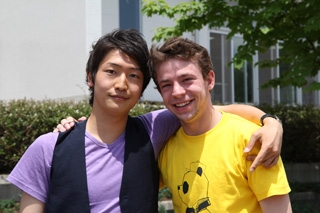
■ Alexander Redmann (Right)
Nationality: USA
Major: Asian languages and literature
Affiliation:HUSA
■Keisuke Yamane (Left)
Nationality: Japan
Major: Linguistics
Affiliation: Faculty of Integrated Arts and Sciences
Hobbies: Traveling, running, watching dramas
Today, we are with an international student and his Japanese friend for the memorable 20th interview. Let's hear what they have to say!
Thank you for allowing me to interview you today. At first Keisuke, you studied at University of Minnesota via HUSA (Hiroshima University Study Abroad) Program. What motivated you in going out of Japan?
Keisuke: Well, I’ve always been interested in America. For example, I have always really liked Hollywood movies very much since I was a kid. Then, when I was in high school, I met a wonderful English teacher. Because his classes were so amusing, I was “attracted to” him, and I decided to become an English teacher like him. But after I graduated from my high school, I changed my mind and wanted to go and work outside of Japan with English. And also, when I was in high school, I went to Shanghai, China for a school trip. It was a first time for me to go overseas. Talking with people with different cultures was very interesting. Through this experience, I realized what I needed is excitement. In order to get this excitement, I needed the challenge. So I really wanted to go outside Japan. That’s why I chose to attend HUSA program.
Why did you choose Minnesota?
Keisuke: I met a HUSA student who was from University of Minnesota two years ago. I learned a lot of information about University of Minnesota from him, and it was really easy to choose Minnesota as my studying abroad.
Where did you live in Minnesota?
Keisuke: I lived in a dorm.
Alex san, do you know the dorm?
Alex: Ah-ha. I lived there, same building, my freshman year.
Did you live in same building? Did you know each other?
Keisuke and Alex: Yeah, we were already friends.
Wow! How was the life in Minnesota? I’ve never been to, but heard it’s cold in winter.
Keisuke: Yeah, very cold. I couldn’t stand! (laugh)
How did you survive in such weather?
Alex: Ah, in Minnesota, everyone wears jackets and boots; we can get up to a meter of snow or more. At Minnesota, there are also tunnels, which connect all the buildings underground. So, sometimes I use that if it’s really cold, and in extreme cases sometimes they actually close the school due to the temperature. It is dangerous to go outside during those times. That’s how we survive. But in America, the buildings are all heated, so there are central heating, so it’s really, too warm. So sometimes I wear pants and shorts, and when I get to class, I take off my pants and just have shorts, because it’s really warm.
Keisuke: When using the tunnels is very easy to get lost. (laugh) I didn’t use the tunnels, because we have to pass through the hospital, buildings in the tunnel, so it’s very easy to get lost.
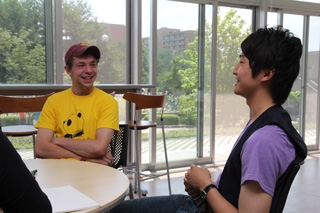
How was food in your daily life in Minnesota?
Keisuke: Food? Yeah, very different. Actually, when we stay in the dorms, we have to buy a meal plan, which means we have to eat in the cafeteria. So I often went to cafeterias to have lunch and dinner. I liked the french-fries there and also like the buffet style, which is we can eat whatever we want. We can have second helping…
Alex: Second helpings, third helpings, as many…
Keisuke: So, it is easy to get fat.
Alex: We have a salad bar… and soup. So, you can eat things that are healthy, but most people don’t do, like me.
Did you eat Japanese food in Minnesota?
Keisuke: Yeah, there are some Japanese restaurants around the campus, so I went there sometimes, but food is really expensive there, so I didn’t go there so much. But there is an organization, Japanese Student Connection (A group consists of permanent residents and long-term stay Japanese in Minnesota), which is organized by those who live in Minnesota for 10 years, 15 years, so they help Japanese students. They cook Japanese food. So, I could eat some Japanese food at least once a month.
Alex: That’s right. Keisuke, did you go to United Noodles? It’s an Asian food market, so they have a lot of the foods eaten here like instant ramen like Japanese snacks…
Keisuke: Ah, yeah!
What did you study at the University of Minnesota?
Keisuke: My major is linguistics, so in University of Minnesota, I took linguistics classes and of course, ESL English classes, and I took Chinese class, too. I like studying languages.
*ESL:English as Second Language
I think all classes were, of course, taught in English. How did you go through the hard work?
Keisuke: Yeah, at first, I couldn’t understand what the teacher said, and it’s hard to read, it’s hard to read textbooks, because we have to read textbooks before and after the classes. I took a bunch of time. First, when I read a textbook, I always looked up every word in the dictionary, but I sometimes happened to have same words, so after a while, it was getting very smooth to read textbooks. I’m accustomed to the speed of speaking, native speaker’s speaking. But at first, I was struggling very much.
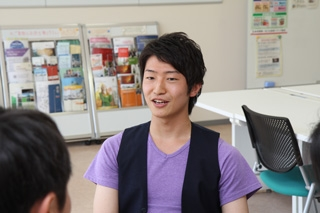
Were there any tutors or volunteer students to help you?
Keisuke: Yeah, of course, while I stayed, buddy Partner at international buddy program, always helped a lot. One of students in Minnesota helped me before I went to Minnesota when I applied to University of Minnesota. She introduced the host family to me, so before the classes started, I stayed in the host family’s house, so the host mother always helped me a lot like treated me a son.
I think the University of Minnesota is very famous for education and research as one of the top universities in the world, and many students from all over the world come to Minnesota. Did you meet a lot of students from many countries?
Keisuke and Alex: Especially students from China and Korea.
How did you feel about such a diversified environment on campus?
Keisuke: It was very interesting. They have a different point of view, different customs. I think it’s very interesting to me. In Hiroshima University, American students are not so many. I think the campus is much bigger than here.
Alex: Fifty thousand (50,000) students. So, it’s a huge campus.
Are there many Japanese students?
Keisuke: No, not so much. Maybe 20 or 30 students, total.
Alex: There are some Japanese students who lived in America, like these Japanese-Americans, too. But foreign exchange students from Japan, for one year exchange, is usually only 15, more or less.
Keisuke: It’s very small.
Alex: Small. But that’s a good opportunity to learn English.
So Alex, you speak very fluent Japanese. When did you study Japanese?
Alex: I started in my high school. I studied for 4 years, and I went to college, and my major is Asian languages and literature, specifically Japanese. And I started over in university, so I learned from the beginning again, like a, i, u, e, o. So, I kind of wasted my high school years. So, I should be better than I am now.
Why did you become interested in studying Japanese?
Alex: When I was in 6th grade, we had a foreign exchange student from Chiba. He was super cool and super kind. My best friend speaks fluent Japanese, so they would always communicate and I was really jealous. I wanted to be able to talk to him. This isn’t fair. So, from that point, I was kind of like, “I wanna learn Japanese,” because it seemed really interesting. And then, in high school, I started Japanese, and, we hosted two foreign exchange teachers. So I got opportunities to speak with them and I loved my high school teacher. She was really encouraging and a lot of fun, and she recommended the University of Minnesota (to study Japanese). So, that’s why I went to Minnesota.
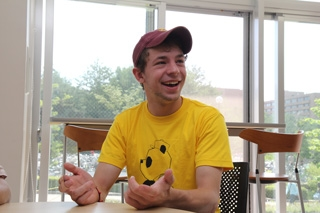
Oh, I see. What was your major course in Minnesota?
Alex: It’s Asian Languages and Literature, specifically Japanese. And also, ESL, teaching English as a second language.
I think you can get a lot of information about Japan. You can meet a lot of Japanese in Minnesota, but actually, you came to Japan. Why did you want to come to Japan?
Alex: This is my third time being in Japan. My first time, I just traveled all of Honshu, Japan. And the first time I came, I loved it. I loved my host family. They were super kind. I loved the food. The people here I respected and I knew that I wanted to come back. And so, the second time, I came back just last summer. I lived in Fukuoka and taught English there. And I had so much fun again, and just fell in love with the Japanese lifestyle more and more, so I wanted to come back. I wanted to study at Hiroshima, because my sempai studied here and told me many great things about it. And they encouraged me to study, and one of my professors also said, “You should study in Japan. We’d love to have you in the program.”
What was your impression when you arrived in Saijo?
Alex: Saijo… I thought the university was actually in Hiroshima, so I was surprised when they said, “Oh, it’s not in Hiroshima. It’s in Saijo.” I really like this area, because less people speak English, so it’s more opportunity to speak Japanese, which is why I wanted to come here and not Tokyo.
Did you have any feeling of anxiety when you start your life in Saijo?
Alex: A little bit, but for me, I was really fortunate, or lucky, because I knew Keisuke and my friends. I have a lot of Japanese friends, so if I had questions, I could ask them, and they were very helpful and saved me.
So, how has your HUSA experience been?
Alex: I love the HUSA program. It’s been really good. Like, I enjoyed the Japanese classes with other foreign students, because we’re learning Japanese and the level is quite good for me. It’s challenging enough, but yet, a relaxed feeling.
Did you attend any regular classes in which Japanese students attend?
Alex: Yeah, I took some. In one of my classes now, it’s half Japanese people. And the classes are taught in mostly in English, but we switch it to Japanese when they don’t understand or, sometimes our teachers would just use Japanese. So, it’s a good opportunity to meet more Japanese friends. And I enjoyed the experience.
What is the interesting class to you in Hiroshima University?
Alex: Interesting class… I’m really enjoying my education class. With Hotta Taiji sensei (Associate Professor of International Center). Because in the future, I want to be an English teacher, so we’ve talked a lot about English education in Japan. What’s good about it, what’s bad about it, what will change. And it’s also really cool, because Hotta sensei is very high up, and respected. So, it’s really nice to talk with him, because of his credentials. He’s sharing with a lowly student like me. That's why I really enjoy his class. And of course, I love the Japanese classes.
So, how is your Saijo life after classes?
Alex: After classes, I have a lot of free time to go to Karaoke and to hang out with friends. I’m in a basketball circle and a volleyball circle, and that’s another great opportunity to speak Japanese, ‘cause most people there don’t speak English. It’s a lot of fun.
That’s interesting. So Keisuke, what did you gain from HUSA program in Minnesota?
Keisuke: I can get good English abilities. I think, thanks to the HUSA program. I can speak English more fluently than before.
Alex, anything you feel like you’ve gained by coming here?
Alex: My language has improved. It’s not as good as it should be, because I don’t study much, which is bad, but most of my learning has come through just hanging out with friends and speaking Japanese. I am very happy because I have friends for the future, and because I plan to be back in Japan, it’s always important to have friends.
Keisuke, you are now fourth year student, and what will you do in the future?
Keisuke: I already got a job offer; I will start working in Tokyo from next year. My job is related to a lot of countries outside Japan, so I will have a lot of chances to go outside of Japan.
Alex, what do you want to be?
Alex: I have one more year and then I will graduate. And I will come back to Japan hopefully as a JET*. Or, my State has a special program with Chiba, and it’s the same thing as JET, but they pay a little bit more, and you’re guaranteed to be in Chiba. So, it’s a big city, so I haven’t decided yet.
*JET: The Japan Exchange and Teaching Programme
Thank you very much. And the last question, are there any advice you have for Japanese students who want to study abroad?
Keisuke: First, I want all Japanese students to use English here, because when I went to America, it was really hard to speak English. I could understand what everybody is saying, but I couldn’t express my feeling. Hopefully, there are a lot of chances to use English here, so I want them to especially speak English. Actually, it is very important to speak to native speakers to overcome shyness.
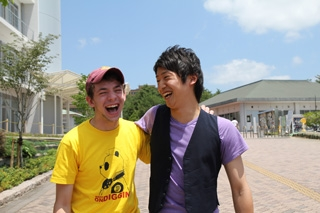
Alex, could you give us advice for international students who want to come to Japan.
Alex: I think when you come to Japan, definitely, make friends. Studies will be a little bit easier, but don’t waste your time. Make sure that you make friends, and don’t just sit in your room and be to yourself. It’s important to study before you come to. And don’t be afraid to speak to Japanese people. They want to speak to you, so just make sure that you get involved. Get involved to a club or a circle, because that’s a really good way to make friends and to use Japanese to learn. So, I’d say the biggest thing is “try” to use your Japanese. Don’t be afraid to be wrong. That’s the best way to learn. You WILL learn from your mistakes.
That’s a good advice. Thank you very much.
Keisuke and Alex: Thank you.
Photo Gallery

Memories of Minnesota (1)

Memories of Minnesota (2)

Group photo of HUSA students


 Home
Home